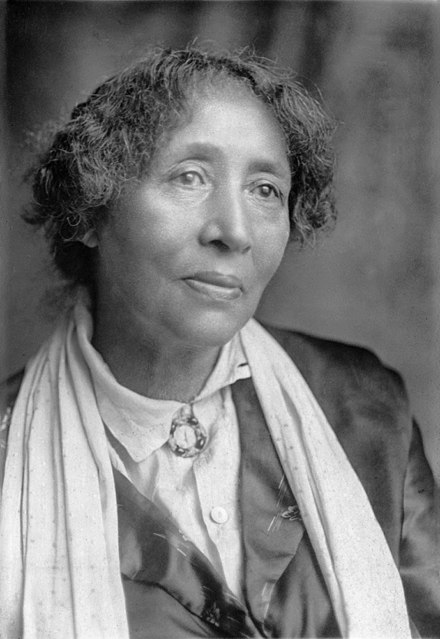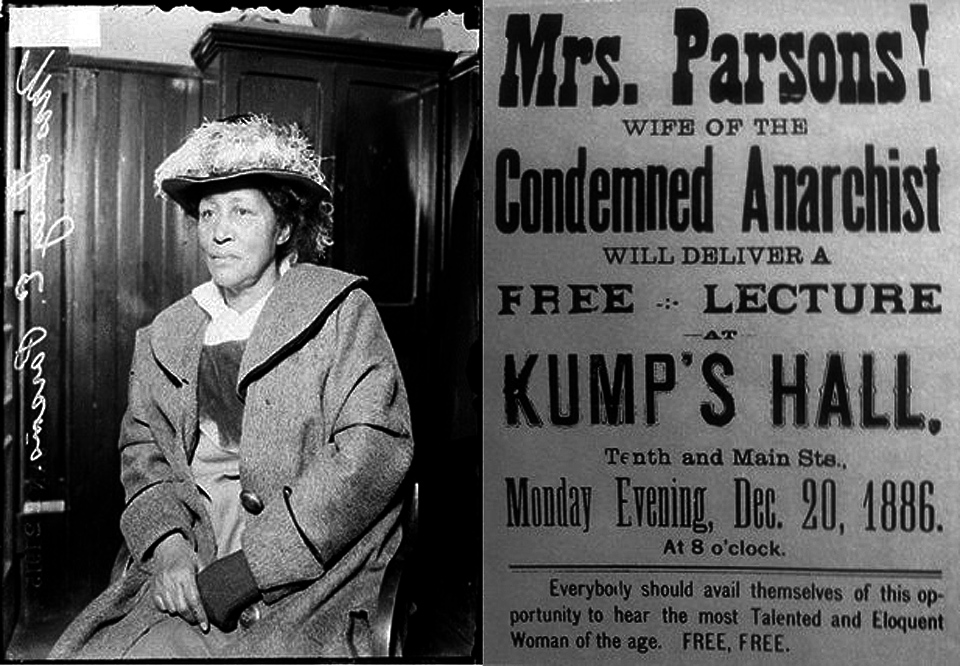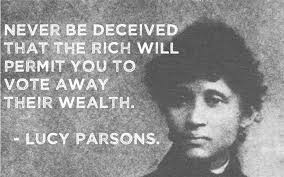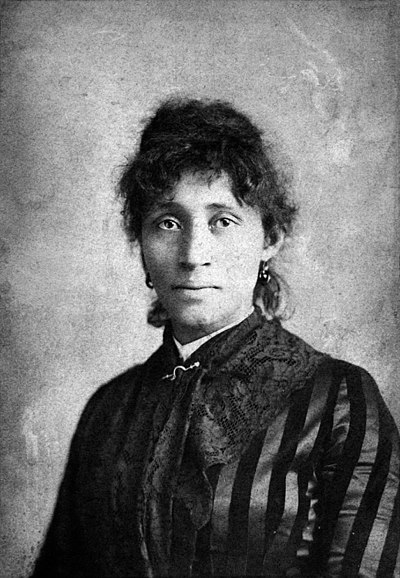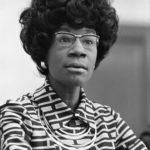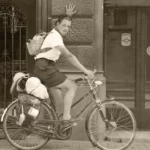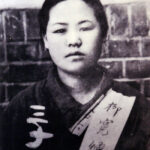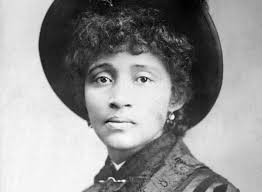
Lucy Parsons
Anarchist Leader of the Labor Party and Advocate for Workers’ Rights
This week, Sara researched Lucy Parsons, and enlightens all us Broads as to the history of the Labor Party & Anarchist Movement in the early 20th Century United States!
Lucy Parsons fought her entire life for workers’ rights. She was possibly born a slave, but claims not to be Black at all. Still, she is considered by many to be one of the most important figures in the Labor Movement throughout 20th Century America. She was considered by the FBI and various government agencies to be “more dangerous than 100 rioters” due to her skill as an orator to unite people behind a common goal.
She and her husband Albert Parsons were both a part of the Haymarket Riot, for which Albert was hanged, despite later evidence revealing him to be innocent.
Check out the full episode to learn more about what Lucy Parsons accomplished during her life, and why she is a Broad You Should Know!
Episode Transcript
(please excuse any errors, spelling or otherwise – audio transcription is tricky)
Hello, and welcome to BROADS YOU SHOULD KNOW: The podcast about amazing and Noteworthy Women in History. I am Sara Gorsky.
Sam Eggers 1:02
I’m Sam Eggers.
Chloe Sky 1:03
And I’m Chloe Skye.
Sara Gorsky 1:05
Today I am bringing you Lucy Parsons. Have you guys heard of Lucy Parsons?
Sam Eggers 1:11
No.
Chloe Sky 1:12
No, I had not heard the name before you texted us her name and that you were covering her.
Sara Gorsky 1:16
Well, I hadn’t heard her name either, and then she kind of came up in one of my newsfeeds at some point and I screenshotted it and then I went back and looked at her and I am crazy about her and I’m so excited to talk about her with you guys today.
I do want to start with saying that on record, Lucy did not like people digging in her private life. At one point there’s a quote from her that says, “I am not a candidate for office, and the public have no right to my past. I amount to nothing to the world and people care nothing of me. I am battling for a principle.” So the details about her personal life are kind of subject to dispute. There’s not like a ton of information especially about her early life before her very public and political activities. So I always like to like say that at the beginning of the podcast.
So, Lucy Parsons was born in Virginia in – supposedly – born in Virginia in 1851. As Lucia Carter. Her mother was an African American slave owned by a white man named Tolliver, who may have been Lucy’s father, says a source, however, Lucy specifically denied that she was the child of a former slave of African descent claiming she was born in Texas and her parents were Mexican and Native American. And she often described herself in public, when she did speak about it, as a Spanish Indian maiden.
Chloe Sky 2:41
Oh, wow.
Sara Gorsky 2:41
And even on her death certificate, her parents names were listed as Pedro Diaz and Maritas Gonzalez, both born in Mexico. So
Chloe Sky 2:50
On her death certificate?
Sara Gorsky 2:51
On her death certificate, so
Chloe Sky 2:54
But not her birth certificate. Well, yeah, I mean, I guess she maybe she wouldn’t even have one of those…
Sara Gorsky 2:58
Question mark if that even existed. So, there’s all this – like, who was she actually born to? She said she was born to these people but then there’s some records that indicate that she – that her mother was a slave and she was possibly the – the child of, you know, slave rape.
Sam Eggers 3:15
Interesting.
Chloe Sky 3:16
She would claiming that she wasn’t black at all.
Sara Gorsky 3:20
The description of herself in that in that way would indicate that you’re correct. So if she described herself as a Spanish Indian Maiden, she would not be claiming African descent at all. However, she’s described by other people as mulatto, her photos, she she looks dark skinned, and her and her I mean, we’ll find out in a second but her and her husband suffered from a lot of discrimination because there was – it was an interracial marriage. So I think she’s like, generically known as a black woman, but then didn’t describe herself that way which I find very interesting and – but, because there’s not more details about it, I just kind of can’t even speculate as to why or what the the truth behind all that is. But isn’t that interesting,
Chloe Sky 4:01
Right?
Sam Eggers 4:02
Yeah.
Chloe Sky 4:03
That’s it sounds almost like the OJ complex of like, “I’m not I’m not black I don’t want to be considered black. I understand like, the way black people are discriminated against and are second class citizens and I don’t want to be associated with that.
Sara Gorsky 4:19
Yeah. Yeah, I don’t know.
Chloe Sky 4:21
Not to compare her to OJ Simpson. In no other way do they have similarities.
Sara Gorsky 4:28
That’s a different kind of anarchy… So um, she was born in Virginia, and then in 1863 Tolliver, the slave master, relocated to Waco, Texas and brought his slaves which included Lucia’s mother and Lucia. In that version of the story, in the other version of the story, I don’t know what the alternate way she got to Texas was. So, supposedly when she’s in Texas, she works as a seamstress and a cook for different white families. And she lived with – her possibly was even married to – a former slave named Oliver Gating and she also apparently at that time had an infant which died at birth. But there’s not any solid records on that she never really spoke to that this is all kind of still speculation.
Then in 1871, she marries Albert Parsons. Is that a familiar name to either of you?
Sam Eggers 5:16
Mm hmm.
Sara Gorsky 5:17
Alright, then you’re gonna find out more about him too. He is also a very loud person in American history. So Albert is a former Confederate soldier, but who’s like since done like this total 180 and become an absolute advocate for black rights. And he falls in love with Lucia and they get married. He had been, like, working really diligently on registering black voters. And he was shot in the leg because of it and he was threatened with lynching. And when he married Lucy, they were like, “We got to get out of here because we are – our lives are threatened because of our interracial marriage. “So so they’re like, “let’s get out of here” and they go to Chicago.
Sam Eggers 5:59
Good idea.
Sara Gorsky 5:59
And during the trip to Chicago, Lucia changes her first name to Lucy. So she’s now Lucy. So, her and Albert are both incredibly active politically, and they both become a part of the movement that’s like, generically known as anarchism, as well as the big union – I, how do I segue into the segment because it’s such a giant – I feel like I need to give some background on some of these movements, because they’re, they’re absolutely huge.
Chloe Sky 6:28
Like were like was their actual policy “anarchy”, or that’s just like how white people said it was?
Sara Gorsky 6:33
Well, there was the Labor Party, which is kind of what they were a part of. And there were different divisions in it, and anarchists were one of the divisions. So I’ll try to kind of go through and explain, and I’ll encourage everybody, including listeners that you know, if you hear something that’s interesting, look it up because it is a huge part of American history that I think mostly was never taught, even though it’s super relevant to a lot of things and especially relevant right now in this time when we’re kind of re-examining the top 1% and who makes the rules and who benefits from the rules and slave, you know, slave labor not getting paid much for what you’re working on. This is really what what Albert and Lucy both really fought for.
So in July, I’ll pick it up in July of 1877. The railroad strikes that were happening kind of in Pennsylvania at the time move into Chicago. And the rail workers waged this militant kind of strike/battle. They derailed an engine and baggage cars, and they kind of they started these sporadic battles with the police who are trying to break them up and break up they’re striking. And Albert was a huge, he was always involved with all of these, these strikes, these movements for laborers rights, union rights, right? And so as as this railroad strike is heating up, Albert speaks to crowds of up to 25,000 people and he promoted peaceful ways of negotiating and his, like, the speaking that he did in the public appearances brought him really to the forefront of the anarchist movement in Chicago at this time. However, his bosses were a fan. He was a writer at The Times. But when he started to speak out loud and and head up some of these movements, he was fired from his job at The Times and he was blacklisted in Chicago printing trade. So basically, he wasn’t allowed to write anymore. And so Lucy opens a dress shop to support their family. And her and her friend Lizzie Holmes, who also in some sources was referred to as Lizzie Swank – I didn’t dig further into that – they started hosting meetings for the International Ladies Garment Workers Union, the ILGWU and they were leading marches of seamstresses in Chicago. And Lucy – they also ended up having kids, her and Albert, so she’s juggling her family, the kids and all this political work which is becoming kind of more and more heated as all of these labor movements are really starting to pick up some steam. In 1883 Lucy and Albert help found the International Working People’s Association, the IWPA. And Lucy begins to write – she’d already been writing but she begins to write for a bunch of publications supported by the IWPA, including the Socialists and the Alarm, which was an anarchist weekly, published by the IWPA. And she really in all her articles, she lambasted these bosses who are paying their workers substandard wages One of her most famous articles is entitled “To Tramps”, and what she advocated was “propaganda by the deed”, which was this philosophy that said that only violent direct action or the threat of such action will ultimately win the demands of the workers. And she was considered extremely dangerous. More dangerous than her husband because she was super outspoken on her beliefs and on the rights of the poor. And she also kind of, in all of her literature, she really threatened like, she was like a threatening militant and radical woman who refused to just be a homemaker and stay at home. There’s like some of official documentation in late, much later in the 1920s that described Lucy as, “more dangerous than 1,000 rioters”.
Sam Eggers 10:09
Oh, wow.
Chloe Sky 10:09
Wow
Sara Gorsky 10:10
Because she was so – she was so verbose. And so – that’s a little bit of like a preview of what’s to come…
Chloe Sky 10:16
Good at igniting other people to action.
Sara Gorsky 10:18
Yes. So at this time period in general, people were working six days a week, 60 hours, on average of like, $1.50 an hour, they were getting paid nothing. And they weren’t they didn’t have protections. This is really before unions kind of came into power in the country, right? So all of these bosses were paying nothing for people’s exorbitant working hours. And this is cross-industry. So this is the railroads. This is the seamstresses. This is all of these low level workers. And part of that was there was a huge influx of immigrants at this time. So immigrant labor was super, super cheap, but immigrants tended to be the poorest and the least represented, right? So they were working these crazy hours. And so both Albert and Lucy were were huge advocates for them.
And so as all of that energy is kind of building in the movement on Saturday, May 1, 1886, 350,000, workers across the nation walked off of their job in a mass general strike.
Chloe Sky 11:17
Wow.
Sara Gorsky 11:18
And in Chicago alone, Chicago alone saw 40,000 workers striking. And it was this huge whirlwind. And all of the prominent radical leaders such as Albert and Lucy, they were like, “it’s time for revolution, like the time is ripe, because the people are hungry and they’re in the streets and they’re striking” and during the strike on May 1 ,1886, Lucy and Albert supposedly lead a march of 80,000 people down North Michigan Avenue striking for workers rights
Sam Eggers 11:52
Nice
Sara Gorsky 11:52
Which is a huge amount of people. 1886 – 80,000 insane.
Chloe Sky 11:57
So this is just like barely after slavery ended, or like –
Sara Gorsky 12:01
It’s not long – yeah. Emancipation if you’re talking about …
Chloe Sky 12:05
Yeah, emancipation.
Sara Gorsky 12:06
And this, of course, you know, this is obviously in the north versus the south where the South had its own set of issues. But here we’re talking – you know, this movement specifically was immigrants in general, poor folks and the union laborers. So there’s all this activity there’s a huge march and there’s a big protest and I’m glossing over some of those super details and so that this podcast doesn’t get too long. But there’s a huge protest at a mill and a couple of workers are killed by the police and the radical advocates and the workers in general were extremely incensed about it and they organize a meeting at Haymarket Square in downtown Chicago. Is that a familiar name to you guys Haymarket? That is a…
Sam Eggers 12:45
Mmm mmm
Sara Gorsky 12:45
– an important American reference. So over 2,000 people show up to hear the speakers even the mayor of Chicago, and the event was was really peaceful. Albert speaks in front of the whole crowd. Everything is peaceful. The police are there, but it seems pretty calm and then the mayor leaves and the group starts to die down. It’s like 10 o’clock at night and suddenly this huge army of police starts marching towards the crowd and gives them an order to disperse. And while this is happening, while the police are like confronting this would have been a really peaceful crowd, a bomb is thrown into the crowd of police killing an officer and injuring a bunch more of them. And this huge riot breaks out and the police just start shooting everyone. And the people are running. And with one of the articles I found said that the police mostly shot themselves, like – it was like late at night. There wasn’t great street lighting at this time period. And they just start shooting their revolvers everywhere and there’s just kind of terror in the streets. Seven people and four workers are killed and an estimated over 70 people are wounded, mostly police but possibly more and – and a lot of workers didn’t seek medical attention because they were nervous about getting arrested and associated with it all. So a lot of people probably like went and got stitched up by their neighbors, and did not, you know, go into the authorities, so, possibly 70, but possibly way more were injured. And there’s A LOT of speculation about what actually happened that night. And the kind of generic belief is that Pinkerton’s men were the ones who threw the bomb.
Sam Eggers 14:26
Ohhhh
Sara Gorsky 14:26
they were the ones. They were the ones that were kind of sent. They were like the Blackwater of the time period where they were hired by the rich bosses to break up these union mobs and stop the protests, right? And so there’s a generic belief at this time that that is what happened – that a Pinkerton man through bomb.
Chloe Sky 14:43
I think that’s usually the case. Like, I feel like the violence at protests is almost always instigated by people who want to discredit the protest.
Sam Eggers 14:53
Yeah,
Sara Gorsky 14:53
But what happens in this situation is that there is a huge lengthy trial and basically the anarchists and radical leaders are all arrested who were a part of the Haymarket protests that day they’re all arrested
Chloe Sky 15:07
Of course.
Sara Gorsky 15:08
Like nine – I think there were nine of them in total and they are accused of being the ones who threw the bomb immediately and the police and the wealthy
Chloe Sky 15:16
So they were there to target them.
Sara Gorsky 15:18
Exactly! and so the wealthy the mob you know all the bosses all the guys who don’t want these labor unions to organize all like immediately are like “these guys are the ones who did it”. And they put together this like absolutely faux trial where they – they select this jury like completely illegally they like stack it with people who are anti-radical and anti-union and this like it’s basically this like farce of a trial. And it goes on and on. Even just the Wikipedia page about the Haymarket Riot and the trials is huge. And then of course, a lot of other sources about it too.
But I should have said Albert turns himself in because he believes – he knows that he’s innocent. He knows that he wasn’t a part of the bomb building and that none of the people he worked with did that and he believes like “okay, I didn’t do this there’s gonna be no evidence that I did this I had nothing to do -” there was there was one member that was connected to one of the parties but not Albert’s that they did find like bomb materials in his house. But, like ,but Albert
Chloe Sky 16:26
They were planted!
Sara Gorsky 16:27
Well, who knows who knows I you know, there’s all this – it’s insanity when you like look down the rabbit hole of like, who what the evidence was all this stuff. It’s like crazy because basically all the evidence was just like thrown out by the cops who did not want, you know, cops were hurt. Cops were killed. And so these people had to die. So basically, after this huge, long trial, the men…
Chloe Sky 16:50
How convenient for them.
Sara Gorsky 16:51
The men accused – a couple of them were released, but most of the men accused including Albert were sentenced to death by hanging.
Sam Eggers 16:58
Oh.
Chloe Sky 16:59
Oh my God
Sara Gorsky 17:00
And two of them were given life sentences and one got 15 years of prison after an appeal.
Sam Eggers 17:06
And so Albert was sentenced.
Sara Gorsky 17:09
Albert is sentenced to death by hanging.
Chloe Sky 17:12
Really underestimated how racist the cops were.
Sara Gorsky 17:15
Not – I mean out I mean a white guy Albert’s not a black guy he you know, so it’s not even racist it’s anti-union right?
Chloe Sky 17:24
Well,
Sara Gorsky 17:24
And it’s anti-radical specifically. Like, these these radical leaders of the time period
Chloe Sky 17:30
He’s married, he’s married to your broad right to Lucy?
Sara Gorsky 17:33
Yes
Chloe Sky 17:34
Then that’s racism.
Sara Gorsky 17:35
It is, of course it is. I mean, Chicago cops, let’s be serious. Not very much has changed.
Chloe Sky 17:40
I just read an article about like, I just read an article about a family in Atlanta, a mixed race couple who – they got their house appraised
Sara Gorsky 17:51
I saw that too, in Florida!
Chloe Sky 17:53
Yeah, yeah!
Sara Gorsky 17:53
crazy and it came in 40% less when they hid the evidence that that the wife is black. Oh, my gosh isn’t that so gross?
Chloe Sky 18:02
Mm hmm.
Sara Gorsky 18:03
So, anyway so you see is she is like stricken with grief about it but also proud that her husband’s like dying for his beliefs, but she goes around the country so there’s a period of time between when the trial concludes and when the death by hanging is supposed to happen. And so she goes around the country and she tours the country distributing information about the trial, and how unjust it was and gathering funds for the families and the leaders and try to help them – and try to help their appeal processes and almost everywhere she went in the country Lucy is greeted by armed police who barred her from going into meeting halls. They did NOT want an anarchist speaking and, like, inciting violence is what I’m sure they said to themselves, but they don’t want those ideas to spread and they don’t want this unjust trial and all the racism and all the classism -. And in the process of trying to save all the lives of the men, including her husband, she also kind of created – or not created, but she she ran into a big split within her own party. So the this radical anarchist party, there was a big segment of them that was called the Knights of Labor. And she had belonged to this group for over 10 years. But the Knights of Labor took a stand against the Haymarket activists and the leader of the Knights of Labor, I guess, the summary version of it is that he believed in passiveness and a passive approach to the labor struggle. And he opposed striking. And so he did not want that trend to continue. So he stood against the defendants in the Haymarket trial. And he believes –
Chloe Sky 19:38
that doesn’t sound like somebody who wants change…
Sara Gorsky 19:40
And he – well and he believed that, like, that the government should make an example of them. So Lucy’s like “WHAT THE FUCK”. So she’s got this huge split
Chloe Sky 19:48
Sounds like a double agent to me.
Sara Gorsky 19:50
I – so, these labor movements have such fascinating organization – like as you read about these, I think I say this like every single podcast now, I had no idea how splintered some organizations were. And sometimes we learn this, like, overview of them, but that we don’t know that there was so many dissenting voices, you know, amongst them even with like, you know, even with Ella Joe Baker being against Martin Luther King and like, there’s all these divisions within – it’s so complicated, in almost every case, it’s like never a unified voice. It’s very interesting.
So anyway, so she had a break, kind of, with the Knights of Labor who were like one of the big portions of the anarchist movement, but all of her speaking and all of her money raising did not sway. The Illinois courts and the Governor of Illinois was under a lot of pressure to execute the men and four of them were executed, including Albert on November 11, 1887.
Sam Eggers 20:46
Oh man.
Sara Gorsky 20:47
Lucy brought her two kids with Albert to see their father one last time. But at the gate of the prison she was arrested along with her kids, taken to jail, forced to strip, left naked with her children in a cold cell until the hanging of her husband was over.
Sam Eggers 21:02
What? So that she didn’t – the kids she
Sara Gorsky 21:04
They couldn’t even see him the one last time.
Sam Eggers 21:07
Oh.
Sara Gorsky 21:07
Like arrested her and prevented her from seeing him.
Chloe Sky 21:09
That’s so fucking evil.
Sam Eggers 21:10
Oh my god, that’s horrible.
Sara Gorsky 21:13
When she was finally released, she – she vowed to continue to fight injustice, even though her husband had been killed and she feared the same for herself.
Sam Eggers 21:22
Oh man
Chloe Sky 21:23
Whoooo
Sara Gorsky 21:24
And she – at this point, this was a you know, definitely like all was rough. She lived in poverty right at this point. She was getting like $8 a week from the Pioneer Aid and Support Association, which was a group formed to support the families of the Haymarket martyrs – and really the Haymarket – they did become kind of martyrs of the movement and of the unions and, like, these men who died unjustly. And there’s lots of you know, we can dig into it later – and like there was some investigations later, that kind of let the men off the hook but too little too late. They were killed already and all the damage was done, right?
So soon, Lucy’s affiliations with the labor struggle kind of shifted as as the movements were shifting. And she got really frustrated with her own party because they kind of started to work together with the Democratic Party to sway the workers. And so they started to kind of combine forces and Lucy hated that idea, because at the time she felt the Democratic Party wasn’t actually seeking to change what was happening with all the classism. It was just looking to make these, like, minor incremental shifts. The article I found said that “she held an uncompromising, syndicalist position that envisioned voluntary associations of workers supporting and enforcing common regulations. Her political perspective was firmly based in class consciousness. She identified class hierarchy as the pivotal problem in the oppressive systems of her time. And because of this, she she scoffed at reform measures within the existing government, where the rich still lording over the working class”. So as her party kind of started to work with the Democrats, she was like, “I don’t agree with this. I don’t agree with this.”
Chloe Sky 23:08
Well, this is also back before the Democratic Party was. I mean, it’s not socialist, but it’s more socialist in its policies nowadays. Back then it was basically the Republican Party. I mean, not exactly.
Sara Gorsky 23:21
So, there was another party, the Labour Party, and basically the Labour Party was kind of, like, falling into the Democratic Party of it at this time, right.
Chloe Sky 23:28
Mm hmm.
Sara Gorsky 23:29
I think I understand that correctly. I’m sorry to anybody who understands politics much more than I do.
Chloe Sky 23:35
Yeah, I don’t I don’t think it was super long after this that the parties kind of merged
Sara Gorsky 23:40
Yeah, I think so, too. But she didn’t want that she wanted the the Labour Party to continue on its own path and to do it’s own thing and to fight for this like full – she wanted the overhaul, she wanted the revolution, right?
Chloe Sky 23:52
I think she was right. I think it probably should have been that.
Sara Gorsky 23:55
I mean…
Sam Eggers 23:56
Yeah, it’s a little disheartening to hear that quote from her what she what she was after and feel like that’s what we want today. Like, shit, how far have we come? It’s a little…frustrating.
Sara Gorsky 24:10
And she just clearly identified it like the changes that were going to be made were still holding up this system of class segregation, which she was so vehemently fighting against. Oh, you know, she at this point is she’s like a pretty predominant voice in the anarchist radical movement. She goes over to London, and she speaks to the Socialist League of England, and that’s an 1888. So two years after her husband died. Or actually one year. The city like continuously tries to thwart her speaking events, and they fine her for selling copies of her pamphlet “Anarchism”, and she felt her free speech was constantly in struggle and in violation of her free speech that she felt like her voice was continually blocked out. There was a ruling in 1889 that anarchists also have the right to free speech, but despite that, she felt like she always was fighting to have her voice be allowed to be heard at all. And specifically, the police just always were just trying to block the shit out of her.
She also – she was invited to write for the French anarchist journal, Les Taint Noveoux. I don’t speak French, but that sounded pretty good. And then around 1890, unionism got there were a bunch of defeats that kind of happened in the Union fight, including the scaling of the industrial workplace, and then all these new parameters put in – but Lucy kind of tried to try to focus on the international movement more than the local movement at this point. Her with her good old friend Lizzie Holmes in 1891 she starts editing Freedom, a revolutionary anarchist communist monthly magazine. I mean, she she’s still proclaiming the labor struggles of 1892. She talks about the Carnegie Steel Mills in Pennsylvania, the silver mines in Cour d’Alene, Idaho, and she keeps kind of trying to stoke the fire of revolution – that revolution’s coming in her literature just on a more international level than local. And worker conditions are getting worse for the railroads. In 1894. The Pullman workers go on strike in Chicago led by Eugene Debs. But Cleveland, President Cleveland kind of crushes that and for Lucy, this it was just like that she was still like super stoked that the strike even happened and she still felt like the revolution was coming. And she still was like holding the flame, right? The flame of the revolution. She – I do want to say this is like a side note. I don’t know if you guys are familiar with Emma Goldman at all? Do you guys know Emma?
Sam Eggers 26:33
Yes! I was just thinking about her!
Sara Gorsky 26:36
So there’s like a huge note in Wikipedia and all the other sources about her conflicts with Emma Goldman.
Sam Eggers 26:44
Oh.
Sara Gorsky 26:45
Because they technically were both part of the anarchist movement, right? Um, but she really her and Emma really rubbed noses. It’s interesting like, we tried to I’m going to try to say without judgment, but apparently *laughs* , Emma Goldman had this kind of very generic view of anarchism and for whatever reasons she also tied free love in with the anarchy movement. And so….
Sam Eggers 26:45
Emma Goldman did?
Sara Gorsky 27:01
Emma Goldman did so a lot of her speaking was also like very sexually charged and like this huge proponent of free love and the right to love who you want man or woman or whoever and this, you know, however many partners you want this free love movement. Lucy was like, “What the fuck dude focus on the people and focus on the classism. So Lucy’s anarchism was like much more specific about the the workers on the front lines. And, whereas Emma’s was like much more vague and very nonspecific to the actual workers that Lucy was representing.
Chloe Sky 27:49
I think that seems to typically be a complaint that people of color have against white activists.
Sara Gorsky 27:55
Oh, isn’t that…
Chloe Sky 27:57
It’s like you, you seem you seem like you’re you – You want to help but you’re misguided in what you think the problem is.
Sara Gorsky 28:03
I mean, it’s this – this like is another classic strike example of the white feminists ignoring all the struggles of everyone else except for their own weird desires. Although this isn’t feminism, this is anarchism, which you know, so slightly different story, but like the actual same roots. In 1908, Emma was lecturing in Chicago and all the newspaper headlines read that “every popular anarchist had been present with a single exception of Lucy Parsons, with whom Emma Goldman is not on the best of terms.”
Sam Eggers 28:37
Wow.
Chloe Sky 28:38
Wow.
Sara Gorsky 28:38
And Emma was like, “Fuck you, Lucy for not coming to my speech”, and she was pissed about it. So Lucy, in the course of all these things had published a book The Famous Speeches of the Haymarket Martyrs, which was her non fictional firsthand recounting of all the Haymarket martyrs final speeches in court, and Emma was like, “Fuck you, Lucy. For not coming to my speech.” So as payback she endorses a different book called The Bomb, which was a fictional account of the Haymarket affair.
Sam Eggers 29:10
Oh.
Sara Gorsky 29:10
So she doesn’t endorse Lucy’s book she endorses a fake version of the account. Lucy, they like go back and forth. Emma accused Lucy of “riding the cape of her husband’s martyrdom”, which is like the Could you say anything colder to somebody who, like… And Emma notoriously was a Showboat. She loved being the center – center stage and having all the attention and because of all of her discourse about sex and free love, she she really went after – Lucy went after the kind of the free love part of the movement. And Emma jumped all over Lucy’s article about it. And she said in her reply article, “The success of the meeting was unfortunately weakened by Lucy Parsons, who instead of condemning the unjustified Comstock attacks and arrest of anarchists took a stand against the editor of the front firebrand magazine because he tolerated articles about free love”
Sam Eggers 30:03
Dang.
Sara Gorsky 30:04
And then Lucy responded to this attack…
Chloe Sky 30:06
Okay
Sara Gorsky 30:07
But Lucy to her credit I Lucy responds to this attack with “the line will be drawn sharply at personalities as we know these enlighten no one and do infinitely more harm than good.” And I’m like fuck yeah Lucy! Lucy’s like “No Emma. I don’t want any of this bullshit. I want none of your bullshit”
Sam Eggers 30:25
Shutting it down.
Sara Gorsky 30:26
In Emma’s autobiography she barely mentions Lucy except for the presence of “Miss Lucy Parsons, the widow of our martyred Albert Parsons at a labor convention”, she mentions that Lucy took, “took an active part of the proceedings, and later in the book, Emma acknowledged Albert Parsons for becoming a socialist anarchist and praise him for having quote, married a young mulatto.” Oh, and that is all she says about Lucy Parsons. This other giant of the movement is like Emma Goldman was like, oh man, cold as ice.
Sam Eggers 31:01
Wow.
Sara Gorsky 31:02
I don’t – I didn’t know I didn’t like Emma Goldman till I was reading this this historical recounting and now I REALLY don’t like her.
Sam Eggers 31:11
It’s so strange because I’m just thinking one – I guess what I knew of Emma Goldman I’d never heard any of the free love stuff before like I’d never heard that mentioned in her also, I didn’t realize she was a leader of the anarchist movement like I always heard of her as being you know, like she was a you know, pro-union. But I feel like now the term someone being an anarchist or someone being involved in anarchist movement I feel like that is almost taken on a different meaning now than it did then. You know?
Sara Gorsky 31:40
I think I think I’ve heard that – I’ve heard your description of Emma but not … the more research I’ve done the more I’ve understood like the different lines. And I think she’s still considered – like, Emma Goldman specifically is still considered like a “feminist icon” in feminist books and stuff like that. But I think she very specifically like the anarchist movement is a very specific movement at this point in time in history. So it’s really interesting to like have that – anyway I thought that was like this was a total side story, but I thought it was really interesting.
Sam Eggers 32:07
So interesting that like we’ve never heard of Lucy Parsons. So I feel like you know, a lot of people have heard of Emma Goldman. But how many people have heard of Lucy Parsons?
Sara Gorsky 32:15
But Lucy – but Emma Goldman was like the showboat who like made sure that she was the center so that’s why I think she got all this publicity, right?
Sam Eggers 32:22
Oh, interesting.
Chloe Sky 32:23
True. And Lucy Parsons was so actively like “don’t don’t don’t it’s not about me it’s about the movement.”
Sara Gorsky 32:27
Yeah, exactly. Exactly. Well, back to Lucy’s story. Enough about Emma Fucking Goldman! So, in 1907, in 1908, there’s these huge economic crashes and Lucy starts organizing more against hunger and unemployment. In San Francisco her in the IWW takeover the unemployment committee, and they tried to pressure the state to begin a public works project. San Francisco would not acknowledge the committee. As a result, there was a march of 10,000 people and the march was basically unemployed women. In January of 1915 Lucy leads a really successful hunger demonstration in Chicago. And these, this her her success with those demonstrations kind of pushed these other organizations, the American Federation of Labor, the Socialist Party and Jane Addams Hull House to participate in a bigger hunger demonstration on February 12, of the same year, so the next month. And two weeks after the big demonstration, the government starts planning for a decentralization of hunger and employment policy. So they were able to, kind of like, make that policy more localized with all of their marching which I find I find really encouraging when you see progress happen because of the marches. It’s very encouraging.
Lucy in general, there’s a quote about her belief about strikes, and she said, “my conception of the strike of the future is not to strike and go out and starve but to strike and remain in and take possession of the necessary property of production.” So she was kind of like this like forbearer of the sit down strikes later in the US and workers factory takeovers in Argentina and other places around the world. Like, she kind of carried that torch and lit that torch for all those other movements.
And then in 1925, she starts working with the newly formed Communist Party, she hasn’t officially joined the Communist Party till 1939. But she started working with them. And I think she kind of started to align with their kind of their revolution and the class consciousness of their movement, since anarchism had kind of died down a little. There was a little bit of conflict in the sources about whether or not she officially joined the Communist Party or not because the Communist Party didn’t acknowledge that she was a party member when she died, which is I think, something they usually did. But some of the sources I found said that she did join party. So big question mark. And during this period of time, Lucy also works with the Coalition for International Labor defense, which is a Communist Party group. And this was a group that helped aid the Scottsboro Eight and Angelo Hearnon cases. So these are the cases where black men were accused of crimes. And were, you know, like they were given the death penalty, but they were totally innocent. I don’t feel like we have time to go into all those either but look them up the Scottsboro Eight is one of those big stories it’s like the Central Park Five before Central Park Five. So she it works hard for all those justice cases. And then I think we’re just like, I feel like I hit all the major things that she did. She continues to to get out there; Through her 80s she’s still giving speeches in Chicago’s Bughouse Square. Supposedly, her speeches inspired Studs Terkel, and even with her eyesight failing, she kept fighting against oppression. Her last major appearance is when she spoke at the International Harvester in February of 1941. And then on March 7, 1942, at the age of 91 she is killed in an accidental fire in her house in Avondale, in Chicago.
Sam Eggers 35:58
Oh.
Sara Gorsky 36:00
Her lover – I think
Chloe Sky 36:01
Are we sure it was an accident?
Sam Eggers 36:03
That’s what I was thinking.
Sara Gorsky 36:04
I – none of my sources questioned that stuff. But we still have…
Chloe Sky 36:11
Was she a smoker in bed? Was she one of those?
Sara Gorsky 36:14
I don’t know. But she probably wasn’t. She’s too smart. And finally, her lover George Marsdall. He also died the next day from wounds he received trying to save her from the fire.
Sam Eggers 36:24
Oh.
Chloe Sky 36:25
That’s heartbreaking.
Sara Gorsky 36:27
She was 91 – PS she was 91! She wasn’t, like, a spring chicken.
Sam Eggers 36:31
Yeah, that might have been an accident – You know, like sometimes when people are older, you know, she might not…
Chloe Sky 36:36
It’s not always a conspiracy.
Sara Gorsky 36:37
It’s not always – But I will say this: So her friend Irving Abrams, upon hearing about the fire, he comes to rescue Lucy’s personal library of 1,500 books; Books about sex, socialism and anarchy. And he finds that all her books were mysteriously stolen, along with all of her personal papers.
Sam Eggers 36:56
Oh!
Sara Gorsky 36:57
It turned out that the FBI had confiscated all of the books and papers but authorities would not admit it.
Chloe Sky 37:02
It doesn’t sound like an accident. It’s starting to sound like it wasn’t an accident.
Sara Gorsky 37:08
She struggled against freedom of speech her whole life, and then even in her death, her papers were taken away.
Chloe Sky 37:17
Cause that – cuz when was that, when – what year was that?
Sara Gorsky 37:21
Um, she died in 1942.
Sam Eggers 37:25
Totally…. that….Yeah, c’mon
Chloe Sky 37:30
Right around the time that they were going after everybody. We got to erase this scourge in our American, our great American country.
Sara Gorsky 37:41
What – The FBI in the Chicago police. Fuck you guys.
Chloe Sky 37:47
If it was an accident, and then they managed to show up immediately and take all of her documents before anyone could get there.
Sam Eggers 37:56
Yeah, that’s pretty impressive.
Sara Gorsky 37:58
It’s shady as fuck, let me tell you as shady as fuck.
Chloe Sky 38:02
Fucking America. Shit.
Sara Gorsky 38:04
Fucking America. She’s buried. There’s a Haymarket martyrs monument in Forest Park, Illinois and she is buried there with him. I want to close the segment about her with this quote from her because I just think it’s great from an article she wrote, titled I AM AN ANARCHIST.
“I am an anarchist. I suppose you came here the most of you to see what I, a real, live anarchist look like. I suppose some of you expected to see me with a bomb in one hand, and a flaming torch in the other, but are disappointed in seeing neither. As such has been your ideas regarding an anarchist, you deserved to be disappointed. Anarchists are peaceable, law abiding people. What do anarchists mean when they speak of anarchy? Webster gives the term two definitions, chaos and the state of being without political rule. We claim to the latter definition. Our enemies hold that we believe only in the former.
Liberty has been named anarchy. If this verdict is carried out,it will be the death knell of America’s Liberty. You and your children will be slaves. You will have Liberty if you can pay for it. If this verdict is carried out place the flag of our country at half mast and write on every fold shame. Let our flag be trailed in the dust. Let the children of working men place laurels to the brow of these modern Heroes for they committed no crime. Break the twofold yoke. Bread is freedom and freedom is bread.”
There she is.
Sam Eggers 39:29
Alright Lucy
Sara Gorsky 39:30
Lucy Parsons. Guys – I mean, I don’t even feel like I have to ask but what she a BROAD?
Sam Eggers 39:36
Oh my god, come on. Total BROAD.
Chloe Sky 39:39
She spent her whole life fighting capitalism. That’s a – that’s a BROAD.
Sara Gorsky 39:44
Such a broad. Power to the People!
Chloe Sky 39:46
Power to the people. We have the power!
Sam Eggers 39:48
I’m so mad I’ve never heard of her before. Like, yeah, the same feeling we get at the end of these so often – I’m just like how –
Sara Gorsky 39:56
That’s so weird. All of her books and papers were confiscated – how weird we don’t know more about her?!
Chloe Sky 40:10
And during the exact period of time that J Edgar Hoover’s number one priority was to discredit black leaders. What are the odds of that? What are the odds?
Sara Gorsky 40:50
Thank you, guys for, listening to another episode of BROADS YOU SHOULD KNOW. We will see you next week with the story of another BROAD you should know.


